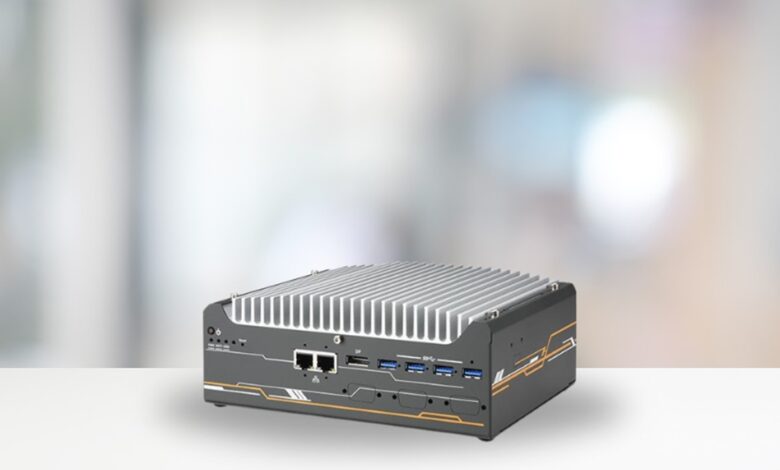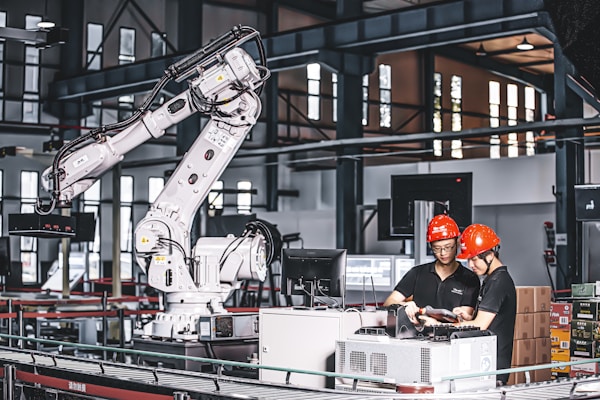Fanless vs. Traditional Industrial PCs: Key Pros and Cons

Choosing an appropriate computing system is essential in industrial environments. Traditional industrial PCs and fanless industrial PCs are both go-to options, although each presents specific advantages. Traditional models have long been a staple, while fanless industrial PCs offer compelling benefits in environments where dust, moisture, and temperature fluctuations are prevalent.
Discover an analysis of the advantages and disadvantages of both types, assisting you in making a well-informed decision.
Performance and Heat Management
Traditional Industrial PCs:
Traditional industrial PCs use fans for internal cooling, which enhances performance. These PCs can manage higher-powered processors and tackle resource-intensive applications with a fan, making them ideal for settings that require heavy computing tasks. The fan system prevents overheating. However, regular maintenance is also required to avoid dust accumulation. Over time, fan issues can lead to breakdowns, affecting system longevity.
Fanless Industrial PCs:
Fanless industrial PCs rely on passive cooling systems, such as heat sinks. This design is quieter and reduces the risk of overheating without requiring a fan. However, fanless models may struggle to support high-power processors, making them more suited for less demanding applications or specific industrial tasks. Fanless PCs present a low-maintenance option for environments where noise is a concern or where equipment must operate 24/7 without interruption.
Bottom Line:
A traditional industrial PC might be more appropriate if processing power is a primary requirement. Fanless industrial PCs are better suited for environments prioritising durability and low noise.
Durability in Harsh Environments
Traditional Industrial PCs:
Traditional industrial PCs are more vulnerable in harsh environments with their reliance on fans. Fans can draw in dust, moisture, and other contaminants, which accumulate over time and lead to potential malfunctions. Traditional PCs are then not recommended for high-dust areas, chemical exposure zones, or extreme outdoor environments unless they have additional protective features.
Fanless Industrial PCs:
Fanless industrial PCs are designed with sealed enclosures, preventing the intrusion of dust and moisture. This sealed design makes fanless PCs the preferred option for manufacturing plants, chemical processing areas, and other harsh environments. They’re also less likely to experience mechanical failure due to fewer moving parts, making them ideal for long-term operations without frequent maintenance checks.
Bottom Line:
Fanless industrial PCs have a clear advantage in environments with dust and moisture, offering superior durability and reliability.
Maintenance and Downtime
Traditional Industrial PCs:
Traditional PCs require regular maintenance to clean and replace fans, ensuring efficient heat dissipation. Fan failure can lead to overheating and unexpected shutdowns, resulting in downtime for essential processes. Remember, any malfunctioning fan can result in costly delays in industries that rely on continuous operations.
Fanless Industrial PCs:
The fanless industrial PC’s passive cooling system requires minimal maintenance, significantly reducing the chances of system failures. There are fewer components to replace without fans, translating into a reduced risk of mechanical issues. These PCs are suitable for applications that require long uptime and minimal supervision, lowering total operational costs and enhancing productivity.
Bottom Line:
Fanless industrial PCs are a better fit for operations where downtime and maintenance costs need to be minimised.

Cost and Scalability
Traditional Industrial PCs:
Typically, traditional industrial PCs are more cost-effective initially due to their broader availability and higher processing capabilities. However, these systems may accumulate more maintenance costs over time. Still, traditional PCs offer a strong balance between cost and performance if the application requires powerful processing on a limited budget.
Fanless Industrial PCs:
Fanless PCs may have a higher initial investment due to their specialised design. However, their low-maintenance nature often makes them cost-effective over time, especially in environments where system failures would incur significant losses. Although less suited for extensive processing tasks, fanless PCs provide excellent scalability for applications where moderate computing power is sufficient.
Bottom Line:
Traditional industrial PCs are often cost-effective for high-processing tasks, while fanless industrial PCs offer better long-term value in low-maintenance settings.
Use of SBC Computers in Industrial Applications
In some applications, SBC computers (single-board computers) offer a compact alternative for industrial environments. While not as powerful as traditional or fanless PCs, SBC computers are highly efficient and suitable for specific applications that require limited computing power, such as remote monitoring and basic data processing. Their compact size and low power consumption make them a practical choice for edge computing in industrial IoT environments.
Conclusion
Selecting between traditional and fanless industrial PCs relies upon the application’s particular requirement. Traditional industrial PCs deliver robust performance, making them ideal for high-powered operations that are mindful of budget constraints and operate in clean environments. Conversely, fanless industrial PCs are better suited for demanding, low-maintenance settings. Additionally, in some applications, single-board computers (SBCs) can be a lightweight alternative, particularly in Internet of Things (IoT) scenarios. One can determine the most appropriate industrial PC to fulfil operational needs by evaluating these considerations.
Visit Voltrium Systems and let us help you maximise productivity with technology you can trust!
